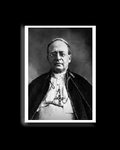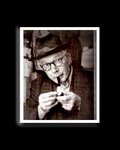by
Athanasius
Why did the new inventions give us the form of society now known and hated under the name of industrial? Why did the vast increase in the powers of production, in population and in accumulation of wealth, turn the mass of Englishmen into a poverty stricken proletariat, cut off the rich from the rest of the nation, and develop to the full all the evils which we associate with the capitalist state?
To that question an answer almost as universal as it is unintelligent has been given. That answer is not only unintelligent, but false, and it will be my business here to show how false it is. The answer so provided in innumerable textbooks, and taken almost as a commonplace in our universities, is that the new methods of production-the new machinery, the new implements-fatally and of themselves developed a capitalist state in which a few should own the means of production and the mass should be proletarian. The new instruments, it is pointed out, were on a vastly greater a scale than the old, and were so much more expensive, that the small man could not afford them; while the rich man, who could afford them, ate up by his competition, and reduced from the position of a small owner to that of a wage earner, his insufficiently equipped competitor who still attempted to struggle on with the older and cheaper tools. To this (we are told) the advantages of concentration were added in favor of the large owner against the small. Not only were the new instruments expensive almost in proportion to their concentration in few places and under the direction of a few men. Under the effect of such false arguments as these we have been taught to believe that the horrors of the industrial system were a blind and necessary product of material and impersonal forces, and that wherever the steam engine, the power loom, the blast furnace, and the rest were introduced, there fatally would soon appear a little group of owners exploiting a vast majority of the dispossessed.
It is astonishing that a statement so unhistorical should have gained so general a credence. Indeed, were the main truths of English history, taught in our schools and universities today, were educated men familiar with the determining and major facts of the national past, such follies could never have takenroot. The vast growth of the proletariat, the concentration of ownership into the hands fo a few owners and the exploitation by those owners of the mass of the community, had no fatal or necessary connection with the discovery of new and perpetually improving methods of production. The evil proceeded in direct historical sequence, proceeded patently and demonstrably, from the fact that England, the seed plot of the industrial system, was already captured by a wealthy oligarchy before the series of great discoveries began.
Consider in what way the industrial system developed upon Capitalist lines. Why were a few rich men put with such ease into possession of the new methods? Why was it normal and natural in their eyes and in that of contemporary society that those who produced the new wealth with the new machinery should be proletarian and dispossessed? Simply because the England upon which the new discoveries had come was already an England owned as to its soil and accumulations of wealth by a small minority: it was already an England in which perhaps half of the whole population was proletarian, and a medium for exploitation ready to hand.
men put with such ease into possession of the new methods? Why was it normal and natural in their eyes and in that of contemporary society that those who produced the new wealth with the new machinery should be proletarian and dispossessed? Simply because the England upon which the new discoveries had come was already an England owned as to its soil and accumulations of wealth by a small minority: it was already an England in which perhaps half of the whole population was proletarian, and a medium for exploitation ready to hand.
When any one of the new industries was launched it had to be capitalized; that is, accumulated wealth from some source or other had to be found which would support labor in the process of production until that process should be complete. Someone must find the corn and the meat and the housing and the clothing by which should be supported, between the extraction of the raw material and the moment when the consumption of the finished article could begin, the human agents which dealt with that raw material and turned it into the finished product. Had property been well distributed, protected by cooperative guilds, fenced round and supported by custom and by the autonomy of great artisan corporations, those accumulations of wealth, necessary for the launching of each new method of production and for each new perfection of it, would have been discovered in the mass of small owners. Their corporations, their little parcels of wealth combined would have furnished the capitalization required for the new process, and men already owners would, as one invention succeeded another, have increased the total wealth of the community without disturbing, the balance of distribution. There is no conceivable link in reason or in experience which binds the capitalization of a new process with the idea of a few employing owners and a mass of employed non-owners working at a wage. Such great discoveries coming in society like that of the thirteenth century would have blest and enriched mankind. Coming upon the diseased moral conditions of the eighteenth century in this country, they proved a curse.
To whom could the new industry turn for capitalization? The small owner had already largely disappeared. The corporate life and mutual obligations which had supp orted him and confirmed him in his property had been broken to pieces by no "economic development," but by the deliberate action of the rich. He was ignorant because his schools had been taken from him and the universities closed to him. He was the more ignorant because the common life which once nourished his social sense and the cooperative arrangements which had once been his defense had disappeared. When you sought an accumulation of corn, of clothing, of housing, of fuel as the indispensable preliminary to the launching of your new industry; when you looked round for someone who could find the accumulated wealth necessary for these considerable experiments, you had to turn to the class which had already monopolized the bulk of the means of production in England. The rich men alone could furnish you with those supplies.
orted him and confirmed him in his property had been broken to pieces by no "economic development," but by the deliberate action of the rich. He was ignorant because his schools had been taken from him and the universities closed to him. He was the more ignorant because the common life which once nourished his social sense and the cooperative arrangements which had once been his defense had disappeared. When you sought an accumulation of corn, of clothing, of housing, of fuel as the indispensable preliminary to the launching of your new industry; when you looked round for someone who could find the accumulated wealth necessary for these considerable experiments, you had to turn to the class which had already monopolized the bulk of the means of production in England. The rich men alone could furnish you with those supplies.
Nor was this all. The supplies once found and the adventure "capitalized," that form of human energy which lay best to hand, which was indefinitely exploitable, weak, ignorant, and desperately necessitous, and glad enough if you would only keep it alive, was the existing proletariat which the new plutocracy had created when, in cornering the wealth of the country after the Reformation, they had thrust out the mass of Englishmen from the possession of implements, of houses and of land.
-Hilaire Belloc, The Servile State

men put with such ease into possession of the new methods? Why was it normal and natural in their eyes and in that of contemporary society that those who produced the new wealth with the new machinery should be proletarian and dispossessed? Simply because the England upon which the new discoveries had come was already an England owned as to its soil and accumulations of wealth by a small minority: it was already an England in which perhaps half of the whole population was proletarian, and a medium for exploitation ready to hand.
orted him and confirmed him in his property had been broken to pieces by no "economic development," but by the deliberate action of the rich. He was ignorant because his schools had been taken from him and the universities closed to him. He was the more ignorant because the common life which once nourished his social sense and the cooperative arrangements which had once been his defense had disappeared. When you sought an accumulation of corn, of clothing, of housing, of fuel as the indispensable preliminary to the launching of your new industry; when you looked round for someone who could find the accumulated wealth necessary for these considerable experiments, you had to turn to the class which had already monopolized the bulk of the means of production in England. The rich men alone could furnish you with those supplies.
















No comments:
Post a Comment